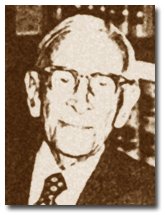Significantly contributed to the field and profession of social welfare as a private citizen
The Bullises had wished Gardner to follow in the footsteps of the family business of building railroads, but he was more interested in working as a public servant practicing law. He attended Cornell University, graduating in 1908 with a Bachelor of Laws degree. After working as an attorney in New York State for several years, he followed some of his family west in 1913 with his new wife. Bullis first settled in Los Angeles and worked for the gas company, while his wife, a social worker, formed the Junior League there and became a director of Children’s Hospital. During WWI, Bullis volunteered for the Coast Artillery and was stationed at Ft. MacArthur in San Pedro with the rank of Buck Private.
The Bullises moved to northern California in 1941 in order for Mrs. Bullis to be near her aging mother. His unwavering patriotism continued, as he remained engaged in politics at a local level in service to his community. During WWII, he volunteered to staff Red Cross activities for soldiers, overseeing 331 chapters. He gave fully and freely of himself in this as in all ventures. For instance, he discovered a legal means to safeguard the establishment of the city of Los Altos, protecting it from commercial development. He then served as the City Attorney for many years to come without any remuneration.
Over the years of a long life, Bullis dedicated himself to public service in many ways. He came to serve in capacities of president, board member and volunteer with the California Association of Health and Welfare. The county Juvenile Court honored him for his years of dedicated service to the Juvenile Justice Commission, the Juvenile Court and to the youth of Santa Clara County. He received honors for “outstanding service” in the fight against mental illness. His law practice was once described as a “front for good works.”
Perhaps the most resounding honor that Bullis received, and the one that says the most about the character of this great and humble man, was the naming of a building wing at Cornell University. What is most striking about this is that the Bullis Room was financed not by Bullis, but by the widow of a dear friend with whom Bullis had attended Cornell. Her donation to the school was made in Bullis’ name, a powerful tribute to a timeless and quietly brilliant public servant who left a great legacy in many forms.
